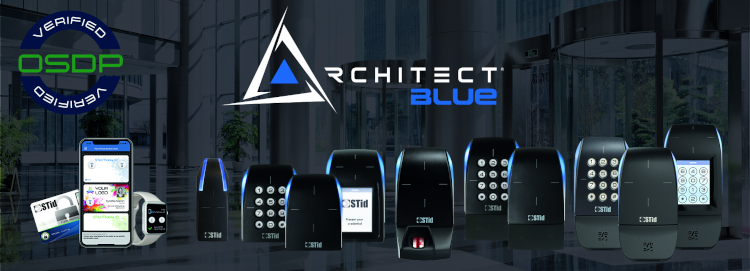Osdp-Certified Access Control Readers
STid’s Architect Blue series have been certified to meet the Security Industry Association (SIA) Open Supervised Device Protocol (OSDP) standard for access control security, the Company announced today. SIA OSDP Verified is a comprehensive, third-party testing program to ensure products meet the stringent global standard established by the International Electrotechnical Commission (IEC).

STid Group has a very wide range of OSDP-certified readers on the market. The multi-technology RFID, NFC and Bluetooth readers can be equipped with a biometric fingerprint sensor for enhanced security; making Architect Blue an OSDP-certified biometric reader. It combines strong 1:1 authentication with fingerprint, card, and Bluetooth smartphone technologies. Additionally, STid offers the first OSDP-certified touchscreen readers with scramble pad function. Architect Blue is one of the only readers to support OSDP File Transfer to update a system’s access control readers remotely. No more time-consuming configuring individual readers on location with configuration cards. Virtual or RFID configuration cards are also available.
“Utilizing the established SIA OSDP North American standard is important for clients requiring higher security such as government applications since it meets federal access control requirements like PKI or FICAM,” Maé Tholoniat, STid product manager. “Our Architect readers have immense flexibility for virtually any use case and now they offer maximum interoperability with other OSDP certified controllers or peripherals further adding to the scalability of our readers.”
Architect Blue Readers: flexible, scalable, modular
STid’s innovative Architect Blue readers are the perfect blend of high security, scalability, and flexibility. STid readers are designed to operate with the STid Mobile ID application, free in the Apple Store or Google Play, which turns smartphones into virtual cards, providing user-friendly and instinctive identification modes.
The Architect Blue series includes seven interchangeable modules that can be connected easily to a smart RFID and Bluetooth core. Intuitive and dynamic, it offers a variety of form factors (mullion, gang box) and features (card reader, keypad, touchscreen, biometrics, QR Code, 125 kHz) for optimal performance in a wide variety of client applications with all functionality and security levels easily upgraded. With a patented tamper protection system, Architect Blue readers protect sensitive data and enables easy deletion of authentication keys, when necessary. They have been designed to withstand harsh environments and high impact, and to operate well outside.
“We strive to ensure future proof/open technology for our customers and OSDP certification for our entire series is an important milestone to continue offering industry leading, high-security access control solutions,” said Frederick Trujillo, U.S. operations manager, STid. “We’ve designed our readers and mobile ID to operate worldwide with any other open solutions an integrator or end-user may use currently or consider in the future.”
Interoperable and open technology-based solutions
STid develops its solutions on standardized open technology such as Mifare Desfire EV2 and EV3 and public encryption algorithms. This gives organizations the freedom to choose what suits them best. The company relies on the quality of its products and their excellent security to win client loyalty rather than any proprietary technology. In addition to being fully compliant with the OSDP open-source protocol, STid’s readers support also the European communication standard SSCP, powered by S.P.A.C., offering end-to-end security between physical and logical access control equipment.
Business Partner















